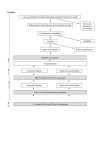Randomised controlled trial of a supervised exercise rehabilitation program for colorectal cancer survivors immediately after chemotherapy: study protocol
- PMID: 17686184
- PMCID: PMC1973083
- DOI: 10.1186/1471-2407-7-154
Randomised controlled trial of a supervised exercise rehabilitation program for colorectal cancer survivors immediately after chemotherapy: study protocol
Abstract
Background: Colorectal cancer (CRC) diagnosis and the ensuing treatments can have a substantial impact on the physical and psychological health of survivors. As the number of CRC survivors increases, so too does the need to develop viable rehabilitation programs to help these survivors return to good health as quickly as possible. Exercise has the potential to address many of the adverse effects of CRC treatment; however, to date, the role of exercise in the rehabilitation of cancer patients immediately after the completion of treatment has received limited research attention. This paper presents the design of a randomised controlled trial which will evaluate the feasibility and efficacy of a 12-week supervised aerobic exercise program (ImPACT Program) on the physiological and psychological markers of rehabilitation, in addition to biomarkers of standard haematological outcomes and the IGF axis.
Methods/design: Forty CRC patients will be recruited through oncology clinics and randomised to an exercise group or a usual care control group. Baseline assessment will take place within 4 weeks of the patient completing adjuvant chemotherapy treatment. The exercise program for patients in the intervention group will commence a week after the baseline assessment. The program consists of three supervised moderate-intensity aerobic exercise sessions per week for 12 weeks. All participants will have assessments at baseline (0 wks), mid-intervention (6 wks), post-intervention (12 wks) and at a 6-week follow-up (18 wks). Outcome measures include cardio-respiratory fitness, biomarkers associated with health and survival, and indices of fatigue and quality of life. Process measures are participants' acceptability of, adherence to, and compliance with the exercise program, in addition to the safety of the program.
Discussion: The results of this study will provide valuable insight into the role of supervised exercise in improving life after CRC. Additionally, process analyses will inform the feasibility of implementing the program in a population of CRC patients immediately after completing chemotherapy.
Trial registration: ACTRN012606000395538.
Figures
Similar articles
-
'Pragmatic randomized controlled trial of individually prescribed exercise versus usual care in a heterogeneous cancer survivor population': a feasibility study PEACH trial: prescribed exercise after chemotherapy.BMC Cancer. 2010 Feb 15;10:42. doi: 10.1186/1471-2407-10-42. BMC Cancer. 2010. PMID: 20156345 Free PMC article. Clinical Trial.
-
Feasibility and efficacy of a 12-week supervised exercise intervention for colorectal cancer survivors.Appl Physiol Nutr Metab. 2014 Jun;39(6):715-23. doi: 10.1139/apnm-2013-0367. Epub 2013 Nov 15. Appl Physiol Nutr Metab. 2014. PMID: 24869975
-
Self-directed physical activity intervention in older adults undergoing adjuvant chemotherapy for colorectal cancer: Design of a randomized controlled trial.Contemp Clin Trials. 2015 May;42:90-7. doi: 10.1016/j.cct.2015.03.008. Epub 2015 Mar 28. Contemp Clin Trials. 2015. PMID: 25827253 Clinical Trial.
-
Interventions for promoting habitual exercise in people living with and beyond cancer.Cochrane Database Syst Rev. 2013 Sep 24;(9):CD010192. doi: 10.1002/14651858.CD010192.pub2. Cochrane Database Syst Rev. 2013. Update in: Cochrane Database Syst Rev. 2018 Sep 19;9:CD010192. doi: 10.1002/14651858.CD010192.pub3 PMID: 24065550 Updated. Review.
-
Home-based multidimensional survivorship programmes for breast cancer survivors.Cochrane Database Syst Rev. 2017 Aug 24;8(8):CD011152. doi: 10.1002/14651858.CD011152.pub2. Cochrane Database Syst Rev. 2017. PMID: 28836379 Free PMC article. Review.
Cited by
-
Message Framing and Physical Activity Promotion in Colorectal Cancer Survivors.Oncol Nurs Forum. 2016 Nov 1;43(6):697-705. doi: 10.1188/16.ONF.43-06AP. Oncol Nurs Forum. 2016. PMID: 27768135 Free PMC article.
-
Exercise interventions on health-related quality of life for cancer survivors.Cochrane Database Syst Rev. 2012 Aug 15;2012(8):CD007566. doi: 10.1002/14651858.CD007566.pub2. Cochrane Database Syst Rev. 2012. PMID: 22895961 Free PMC article. Review.
-
Colorectal cancer survivorship: movement matters.Cancer Prev Res (Phila). 2011 Apr;4(4):502-11. doi: 10.1158/1940-6207.CAPR-11-0098. Cancer Prev Res (Phila). 2011. PMID: 21464030 Free PMC article. Review.
-
Physical activity and diet behaviour in colorectal cancer patients receiving chemotherapy: associations with quality of life.BMC Gastroenterol. 2009 Jul 27;9:60. doi: 10.1186/1471-230X-9-60. BMC Gastroenterol. 2009. PMID: 19635164 Free PMC article.
References
-
- Parkin DM, Bray F, Ferlay J, Pisani P. Global cancer statistics, 2002. CA Cancer J Clin. 2005;55:74–108. - PubMed
Publication types
MeSH terms
Substances
LinkOut - more resources
Full Text Sources
Medical
Research Materials



